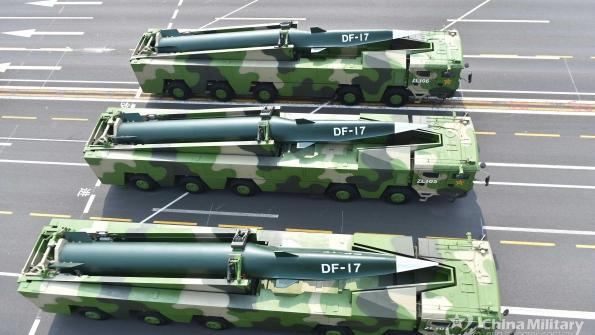Japan revised on Wednesday its End User List, which provides exporters with information on foreign entities possibly involved in activities such as the development of weapons of mass destruction (WMDs).
With the latest revision, the list now totals 706 organizations in 15 countries and regions, up by 36 organizations and institutions — including the China Academy of Engineering Physics (CAEP), the main research and manufacturing center for Chinese nuclear weapons.
Iran has the most listed with 223 organizations and institutions, followed by North Korea with 153 then China and Pakistan with 101 each. Five organizations in Iran and Hong Kong were removed.
The revision will take effect on Monday. Japan aims to prevent the outflow of civilian technology that could be diverted to military use. Exporters are required to get approval from the Minister of Economy, Trade and Industry to export products to the listed organizations unless it is clear that the materials will not be used to develop WMDs such as nuclear weapons or missiles.
China saw seven organizations added. Of all the Chinese entities, about 90% are possibly involved in missile development. Many universities, academies and research institutes are also listed, which reveals the extent of Xi Jinping’s Military-Civilian Fusion policy. Machine tools produced by Japanese companies and others are suspected of being used by the CAEP, according to a Nikkei investigation.
The economy ministry makes the list to enhance the effectiveness of its “catch-all” control system, which obliges exporters to apply for an export license for goods that may be used for the development of WMDs even if the goods are not subject to export restrictions under international agreements. The list has been issued since catch-all controls were introduced in April 2002 and is revised about once a year. It is not an embargo list.
Organizations and institutions newly added to Japan’s End User List
| Country or region | Name of organization or company | Type of WMD concerned |
| China | Baotou Guanghua Chemical Industrial Corp. | Nuclear |
| Beijing UniStrong Science and Technology Co. | Missiles | |
| China Aerospace Science and Technology Corp. Ninth Academy’s 771 Research Institute | Missiles | |
| China General Nuclear Power Corp. | Nuclear | |
| North Korea | Korea Ryonhap Trading Corp. | Biological, chemical, missiles, nuclear |
| Ministry of Rocket Industry | Missiles | |
| Pakistan | Dynamic Engineering Corp. | Nuclear |
| EnerQuip Private | Missiles, nuclear | |
| Rainbow Solutions | Nuclear | |
| Swan International Trading | Nuclear | |
| Russia | Chimmed Group | Biological, chemical |
| Joint Stock Company Angstrem | Missiles | |
| Source: Japan’s Ministry of Economy, Trade and Industry | ||
In addition to catch-all controls, Japan enforces “list controls” by listing sensitive items — including goods, technology or software — that are subject to regulation. List controls require exporters to apply for a license when exporting or transferring listed items to a foreign country.
Even some items not listed cannot be exported without permission if there are security concerns at the export destination. In applying for a permit, the company exporting the item is obliged to check the intended use at the destination to see if there is any possibility that it could be converted into a WMD.
The U.S. has a similar control system, the Entity List, which contains the names of certain foreign persons — including businesses, research institutions, government and private organizations, as well as individuals — that are subject to license requirements for the export of specified items. The Entity List was first published in 1997 and now contains over 2,000 persons.
Although we cannot simply compare them, some pointed out that Japan’s End User List is less effective than the Entity List. The U.S. embargoes exports in principle to persons listed, while Japan only urges caution and does not immediately ban exports.
Japan’s list is also limited in coverage.
The U.S. list includes organizations of security concern in addition to those developing WMDs, and while there are differences in the way the two lists are counted, Japan’s only has about 700 entries. By country, the number of China-related entries for Japan is only 101, compared to about 600 for the U.S. For example, the CAEP has been on the U.S. list since 1997.
If organizations of concern are omitted from a list, they may slip through the checks. The organizations that Japan lists are limited to involvement in WMDs and some military entities are not included.
There are examples of Chinese and North Korean organizations on the Japanese list that are only in English, and Japanese companies have complained that the system is not user-friendly.
For companies with limited resources for research and analysis, the End User List is an important source of information for scrutinizing export destinations. As China, Russia and other countries tighten information controls, it is becoming increasingly difficult for private companies alone to even gather information on capital relationships.
An export control officer at a company that manufactures and sells core components for machine tools said, “There is a limit to what we can do on our own to find out details. He added, “If the screening process takes several months, we may miss out on business opportunities. If an entity is even slightly suspected, we would like it to be listed.”
Professor Heigo Sato of Takushoku University in Tokyo, an expert on export controls, explained: “The U.S. checks every department of organizations of concern in detail, covering both number and quality.”
He suggested that “a special organization be set up within the Japanese economy ministry to analyze the information in detail.”

